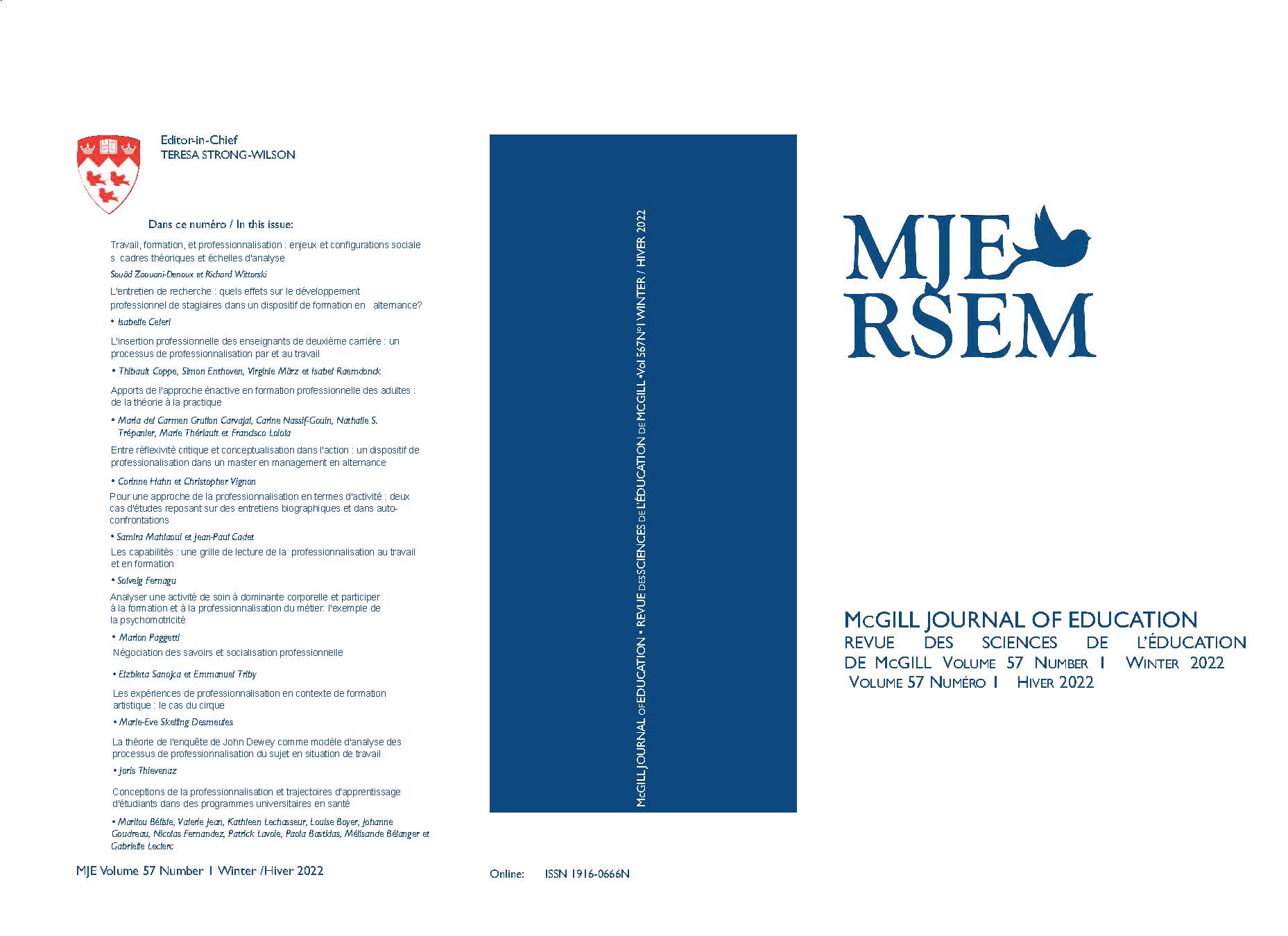Combining critical reflexivity and conceptualization in action: A professionalization device in an “alternance” management master's programme
Keywords:
Management, Alternance, Critique, Conceptualisation, Critical reflexivity, ProfessionalizationAbstract
We present the results of a research project which, by linking management and educational sciences, has enabled us to develop a professionalization device for apprentices enrolled in a master's degree in management. After briefly explaining the context of management education, we describe our framework which, in line with Geay's “alternance” model, combines critical reflexivity and conceptualization in action. We present our methodology and our device, illustrated by an example. Our results seem to confirm that the device allowed students to develop critical reflexivity competencies through the confrontation of experiences and institutionalized knowledge when interacting with peers and changing roles.
References
Akkerman, S., et Bakker, A. (2011). Boundary crossing and boundary objects. Review of Educational Research, 81(2), 132-169.
Antonacopoulou, E. (2010). Making the business school more ‘critical’: Critique based on phronesis as a foundation for impact. British Journal of Management 21(Suppl.), 6–25.
Bakker A., et Van Eerde, H. A. A. (2014). An introduction to design-based research with an example from statistics education. Dans A. Bikner-Asbahs, C. Knipping, et N. Presmeg (dir.), Doing qualitative research: Methodology and methods in mathematics education. Springer.
Brousseau, G. (1986). Fondements et méthodes de la didactique des mathématiques. Recherches en didactique des mathématiques, (7)2, 33-115.
Bruner, J. (2008). L’éducation, entrée dans la culture. Retz.
Chaix, M.L. (1993). Se former en alternance. L’Harmattan.
Cohen-Scali, V. (2000). Alternance et identité professionnelle. Presses Universitaires de France.
Confort-Saudejaud, C., Dechy-Cabaret, O., et Hahn, C. (2019). Retour d’expérience sur un dispositif de réflexivité et de contextualisation en formation par apprentissage : RéCAp. Dans Lemaitre D. (dir.), Questions de pédagogie dans l’enseignement supérieur (p. 852-863). ENSTA Bretagne. https//qpes2019.sciencesconf.org/data/pages/ACTESQPES2019.pdf.
Cunliffe, A. L. (2016). “On becoming a critically reflexive practitioner” redux: What does it mean to be reflexive? Journal of Management Education, 40(6), 740–746.
De Geuser, F., et Fiol, M. (2003). Faire face aux situations complexes : la blessure narcissique des managers. Dans Moingeon, B. (dir.), Peut-on former les dirigeants ? L’apport de la recherche (p. 99-125). L’Harmattan.
Fabre, M. (1999). Situations problèmes et savoir scolaire. PUF.
Fabre, M. (2011) Eduquer pour un monde problématique : la carte et la boussole. PUF.
Geay, A. (1994). L’école de l’alternance. L’Harmattan.
Gerard, C. (1994). Problématiser des situations personnalisées. Se former+, 36.
Ghoshal, S. (2005). Bad management theories are destroying good management practices. Academy of Management learning & education, 4(1), 75-91.
Gomez, P-Y. (2013). Le travail invisible : enquête sur une disparition. François Bourin Editeur.
Hahn, C. (2014). Linking professional experience with academic knowledge in using statistics, a design experiment for business school students. Educational Studies in Mathematics, 86(2), 239-251.
Hahn, C. (2016). Penser la question didactique pour la formation en alternance dans l’enseignement supérieur. Dispositifs frontières, statistique et management. [Note de synthèse d’HDR inédite]. Université Louis Lumière Lyon 2.
Konkola, R., Tuomi-Gröhn, T., Lambert P., et Ludvigsen, S. (2007). Promoting learning and transfer between school and workplace. Journal of Education and Work, 20(3), 211-228.
Lessard, C., et Bourdoncle, R. (2002). Qu’est qu’une formation professionnelle universitaire ? Conceptions de l’université et formation professionnelle. Revue française de pedagogie, 139, 131-153.
Mazalon, E. (2011). Conclusion : l’alternance en enseignement supérieur sollicitée pour des finalités de professionnalisation. TransFormations, 6, 177-1381
Meyer, J. H. F., et Land, R. (2003). Threshold concepts and troublesome knowledge: Linkages to thinking and practising within the disciplines. In C. Rust (dir.), Improving student learning: Theory and practice—ten years on (p. 412–424). Oxford: Centre for Staff and Learning Development.
Mezirow, J. (1990). On critical reflection. Adult Education Quartely 48(3), 185-198.
Parker, M. (2018). Shut down the business school: What’s wrong with management education. Pluto Press.
Pastré, P. (2005). La deuxième vie de la didactique professionnelle. Education permanente, 65, 29-46.
Pastré, P. (2007). Champs conceptuels et champs professionnels. Dans M. Merri (dir.), Activité humaine et conceptualisation (p. 79-86). Presses universitaires du Mirail.
Pérezts, M., Faÿ, E., et Picard, S. (2015). Ethics, embodied life and esprit de corps: An ethnographic study with anti-money laundering analysts. Organization, 22(2) 217–234.
Petriglieri, G. et Petriglieri, J. L. (2015). Can business schools humanize leadership? Academy of Management Learning & Education, 14(4), 625–647. https://doi.org/10.5465/amle.2014.0201
Piaget, J. (1974). Réussir et comprendre. Presses Universitaires de France.
Raelin, J. A. (2007). Toward an epistemology of practice. Academy of Management Learning & Education, 6(4), 495–519. https://doi.org/10.5465/amle.2007.27694950
Raelin, J. A. (2009). The practice turn-away: Forty years of spoon-feeding in management education. Management Learning, 40(4), 401-410.
Rogers, E. M. (2003). Diffusion of Innovations (5eme Edition). Free Press.
Tangaard, L. (2007). Learning at trade vocational school and learning at work: Boundary crossing in apprentices’ daily life. Journal of Education and Work, 20(5), 43-466.
Vergnaud, G. (1996). Au fond de l’action, la conceptualisation. Dans J.-M. Barbier (dir.), Savoirs théoriques et savoirs d’action, (p. 1-18). Presses Universitaires de France.
Viennot, L., et Descamp, N. (2015). Co-development of conceptual understanding and critical attitude: Analyzing texts on radiocarbon dating. International Journal of Science Education, 37(12), 2038-2063.
Wittorski, R. (2008). Note de synthèse : La professionnalisation. Savoirs, 17, 11-36.
Young, M. (2009). Education, globalisation and the “voice of knowledge”. Journal of Education and Work, 22(3), 193-204.
Wright, A. L., et Hibbert, P. (2015). Threshold concepts in theory and practice. Journal of Management Education, 39(4), 443–451.
Published
How to Cite
Issue
Section
License
Copyright (c) 2023 McGill Journal of Education / Revue des sciences de l'éducation de McGill

This work is licensed under a Creative Commons Attribution-NonCommercial-NoDerivatives 4.0 International License.



